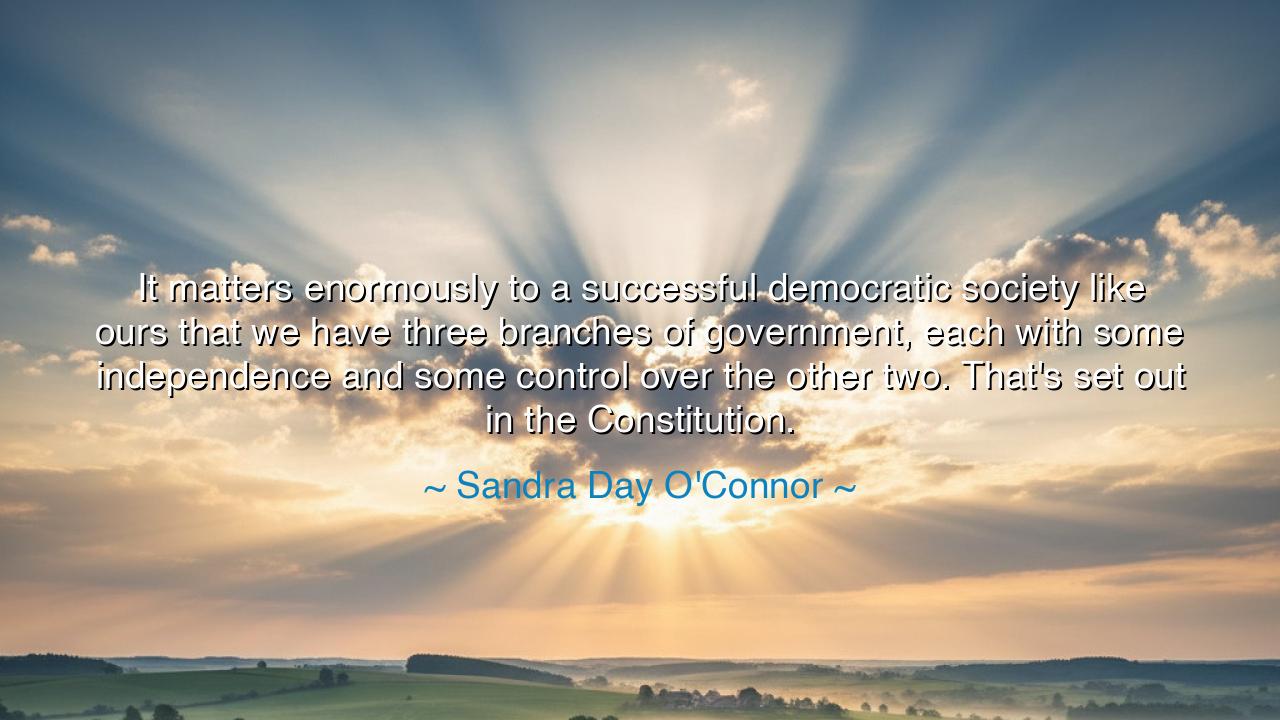
It matters enormously to a successful democratic society like
It matters enormously to a successful democratic society like ours that we have three branches of government, each with some independence and some control over the other two. That's set out in the Constitution.






"It matters enormously to a successful democratic society like ours that we have three branches of government, each with some independence and some control over the other two. That’s set out in the Constitution." — Sandra Day O’Connor
Hear these words, O inheritors of liberty, and weigh them as gold. Sandra Day O’Connor, the first woman to sit upon the Supreme Court of the United States, spoke them not as a mere jurist, but as a guardian of the Constitution — the sacred covenant upon which the Republic stands. Her voice, steady and wise, calls us to remember that freedom is not born from power, but from balance. When she said, “It matters enormously that we have three branches of government,” she reminded the people that their liberty rests not in one ruler, nor in one chamber, but in the harmony of three — the Executive, the Legislative, and the Judicial. Each is a pillar, separate yet intertwined, holding the great structure of democracy upright.
In her wisdom, Justice O’Connor spoke of a truth older than America itself — that unchecked power is the enemy of freedom. The Founders, who had seen the tyranny of kings and the corruption of parliaments, forged a new order where no man or institution could rule without restraint. They divided power as one might divide fire, so that it might warm the house but never consume it. The Legislative Branch would craft the laws; the Executive would enforce them; and the Judicial would interpret them. Each would possess independence, yet each would control the excesses of the other two. Thus was born the system of checks and balances, that wondrous mechanism that makes tyranny impossible without the consent of all.
The origin of this wisdom lies deep in the experience of mankind. For even in ancient times, the thinkers of Greece and Rome spoke of the dangers of concentrated power. Aristotle wrote that every form of government, if left unchecked, decays into its own opposite — monarchy into tyranny, democracy into mob rule, and aristocracy into corruption. Montesquieu, centuries later, in his Spirit of the Laws, taught that liberty can survive only when power is divided. The framers of the American Constitution took these lessons to heart. Having tasted oppression beneath the British crown, they vowed that no single hand, however well-intentioned, would ever again hold all the reins of authority.
Consider the stormy years of the Watergate scandal, when the executive branch, swollen with ambition, sought to place itself above the law. It was then that the Judiciary, led by the Supreme Court, and the Legislature, through its committees, rose to remind the nation that no man, not even the President, is sovereign over truth. The branches checked one another, and through that tension, the Republic endured. This is the living testament to O’Connor’s wisdom — that freedom survives not by harmony alone, but by the friction of accountability. For a government without resistance soon becomes a government without righteousness.
Justice O’Connor knew, too, that this system is not self-sustaining. It depends upon the virtue of the people, and upon leaders who respect the boundaries set by the Constitution. When any branch seeks to dominate the others — when the Executive reaches for too much power, when the Legislature becomes reckless with authority, or when the Judiciary forgets its humility — the balance is broken, and liberty trembles. Yet when each honors its duty, even amid conflict, the nation grows stronger. As iron sharpens iron, so do these three powers refine one another, preventing decay and guarding against the slow tyranny of complacency.
Her message is not only for those who govern, but for all who are governed. For in a democratic society, the people themselves are the silent fourth branch — the conscience of the nation. If they cease to care, if they grow weary of responsibility, then the balance falters. The Constitution is not a relic to be worshiped from afar; it is a living flame that must be tended with understanding and vigilance. To know how your government works is not merely an act of learning — it is an act of citizenship, a defense against the slow erosion of freedom.
So, my children of liberty, take this lesson from Sandra Day O’Connor: cherish the balance of power as you would cherish your own breath. Trust not in men, but in principles; not in parties, but in process. For as long as the branches of government remain separate yet united, independent yet restrained, the Republic will stand. But if ever they fuse into one — if ever ambition swallows accountability, or apathy silences the people — then the great tree of democracy will wither from within. Let no one branch grow too mighty, and let no citizen grow too indifferent. For the Constitution is not self-enforcing; it is guarded by every mind that remembers why freedom demands balance.






AAdministratorAdministrator
Welcome, honored guests. Please leave a comment, we will respond soon